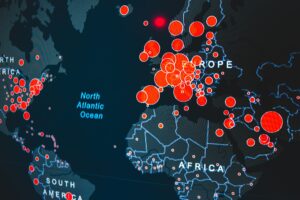In this piece, we celebrate the kids who’ve used their creativity and entrepreneurial spirit to find fascinating solutions to many of the problems we’re facing – from devices to help enforce social distancing, to very affordable ventilators made from parts sourced locally.
Every year, it seems children are becoming more intelligent, innovative and compassionate.
And with most young people today, digitally-native – born into an already digital world – they also have more potential than ever before to push us forward technologically.
At present, the world stands face-to-face with a global pandemic the likes of which we haven’t seen in decades. And while large enterprises and governments are working hard to face this challenge, it’s also being taken head on by numerous young innovators all around the world.
Portable ventilator
– Kartik Tara and Vinayak Tara, India
Two young brothers from Haryana’s Ambala district created a portable ventilator with knowledge they gained in a robotics class. And as if that wasn’t impressive enough, they made one that took social distancing measures into account!
The ventilator is enclosed in a wooden frame which, when compressed, pumps up a ball housed inside. The ball is connected to a motor and circuit which helps to pump that ball, making the entire process automatic.
The entire setup links to a mobile app that allows for remote monitoring. It’s already been trialled in a busy hospital and the brothers are currently talking to medical professionals for advice on how to make it commercially viable.
Xermsol
– Rayvon Stewart, Jamaica
Technology student Rayvon Stewart devised a simple way to prevent the spread of the bacteria and viruses through contaminated surfaces. Originally thought up to help prevent deaths from infection in new-borns, the device has proved to be equally effective on Covid-19.
After doing a bit of research on which surfaces were most likely to contribute to the passing of pathogens, Rayvon created Xermosol – a device fitted to doors that automatically disinfects handles with ultraviolet light after each use. Tests so far have shown it to be more than 99.9% effective at killing pathogens. It’s easy to install and can be used in hospitals, schools, and workplaces.
Rayvon has been struggling to get funding for the mass production of his device. But it was recognised by the Commonwealth Health Innovation Awards and he hopes this will boost interest in Xermsol.
Corona-nearby and Corona map
– Lee Dong-hun, Choi Ju-won, Kim Jun-tae, Lee In-woo, and Park Ji-hwan, South Korea
A group of South Korean students in their early twenties have developed a set of contact tracing technologies to help track the spread of the virus within the country.
 After a year learning programming together, they decided to put their skills to the test when South Korea became an early epicentre in the pandemic. They were concerned about the limitations in the format of the information being shared with the general public.
After a year learning programming together, they decided to put their skills to the test when South Korea became an early epicentre in the pandemic. They were concerned about the limitations in the format of the information being shared with the general public.
So, they created a website called ‘Corona-nearby’ which lays the information on a map to help people know which places are safe to visit. It uses location services of the devices to track areas where confirmed Covid-19 patients have recently been.
They also created ‘Corona map’ as a way to monitor Covid-19 clusters, but this also focuses on dispelling misinformation created on social media platforms. It does this by using raw data from the Korea Centers for Disease Control and Prevention (KCDC) and plotting it on a map.
The young inventors said they’ve received lots of positive feedback and appreciation for their websites. The deep sense of pride, they said, has motivated them to continue working in the public interest until Covid-19 is a thing of the past in South Korea.
Contactless soap dispenser and ventilator
– Ezedine Kamil, Ethiopia
Ezedine was already a prolific inventor before the Covid-19 pandemic came around. At only 18, he had more than 30 inventions under his belt. 
However, since Covid-19 started to become a global issue, Ezedine realised his creative mind could be beneficial to his community.
The first pandemic-related invention he put forward was a contactless soap dispenser. It had an in-built sensor to remove the need for buttons and was also equipped with a manual pedal so the device could also still be used during blackout.
It was a success and more than 50 of them were installed in businesses, hospitals and the university in and around the rural town outside Addis Ababa, the capital of Ethiopia.
But he was just getting started.
Ezedine, who is from a rural town outside Addis Ababa, knew the 557 ventilators, the entire nation had wouldn’t be enough if the situation got worse. So, he searched an open source online manual and built a mechanical ventilator with an Artificial Manual Breathing Unit (AMBU) bag, all of which is controlled from a mobile app.
He hopes once the prototype is completed, it will be used in local communities. However, he still faces issues getting it mass produced, and hopes he’ll eventually receive some investment from either the Ethiopian government or private investors.
Covid-19 has underlined the difference that everyone can make in coming together to combat the crisis. And with their technical skills and impressive inventiveness, young people around the world are making an incredible contribution to the effort.
Discover more about the power of diverse minds and its impact on creativity in our blog, Diverse thinking – The key to creativity and innovation.
Transformational Hybrid SolutionsOur cloud-enablement services offer the best performance on your traffic-heavy websites or mission-critical applications.
Core NetworksTata Communications™ global IT infrastructure and fibre network delivers the resources you need, when and where you need them.
Network Resources
Unified Communications As A ServiceBreak the barriers of borders efficiently and increase productivity with Tata Communications’ UC&C solutions.
Global SIP ConnectEmpower your business with our SIP network and witness it grow exponentially.
InstaCC™ - Contact Centre As A ServiceCloud contact centre solutions for digital customers experience and agent productivity.
DIGO – Communications Platform as a ServiceDIGO is an in-network cloud communications platform, enabling you to power up converged contextual human-to-everything conversations globally.
Unified Communication Resources Case studies, industry papers and other interesting content to help you explore our unified communications solution better.
IoT SolutionsThe Internet of Things is transforming the way we experience the world around us for good. Find out more about our Internet Of Things related solutions here.
Mobility SolutionsTata Communications’ mobility services enable your enterprise to maintain seamless communication across borders, with complete visibility of cost and usage.
Mobility & IoT Resources
Multi-Cloud SolutionsWith enterprises transitioning to a hybrid multi-cloud infrastructure, getting the right deployment model that yields ROI can be a daunting task.
Cloud ComplianceCompliant with data privacy standards across different countries and is also designed to protect customers’ privacy at all levels.
IZO™ Cloud Platform & ServicesIZO™ is a flexible, one-stop cloud enablement platform designed to help you navigate complexity for more agile business performance.
Managed Infrastructure ServicesIntegrated with our integrated Tier-1 network to help your business grow efficiently across borders.
Cloud PartnersWe support a global ecosystem for seamless, secure connectivity to multiple solutions through a single provider.
Cloud Resources
Governance, Risk, and ComplianceRisk and Threat management services to reduce security thefts across your business and improve overall efficiencies and costs.
Cloud SecurityBest-in-class security by our global secure web gateway helps provide visibility and control of users inside and outside the office.
Threat Management - SOCIndustry-leading threat-management service to minimise risk, with an efficient global solution against emerging security breaches and attacks.
Advanced Network SecurityManaged security services for a predictive and proactive range of solutions, driving visibility and context to prevent attacks.
Cyber Security ResourcesCase studies, industry papers and other interesting content to help you explore our securtiy solution better.
Hosted & Managed ServicesTata Communications provide new models for efficient wholesale carrier voice service management. With our managed hosting services make your voice business more efficient and better protected
Wholesale Voice Transport & Termination ServicesYour long-distance international voice traffic is in good hands. End-to-end, voice access & carrier services which includes voice transport and termination with a trusted, global partner.
Voice Access ServicesTata Communication’s provide solutions which take care of your carrier & voice services, from conferencing to call centre or business support applications.
Carrier Services Resources
CDN Acceleration ServicesOur CDN Web Site Acceleration (WSA) solution helps deliver static and dynamic content, guaranteeing higher performance for your website.
CDN SecuritySafeguard your website data and customers’ information by securing your website from hacks and other mala fide cyber activities.
Video CDNDeliver high-quality video content to your customers across platforms – website, app and OTT delivery.
CDN Resources
Elevate CXIncrease customer satisfaction while empowering your service team to deliver world-class customer experience and engagement.
Live Event ServicesTata Communications’ live event services help battle the share if eyeballs as on-demand video drives an explosion of diverse content available on tap for a global audience.
Media Cloud Infrastructure ServicesTata Communications’ media cloud infrastructure offers flexible storage & compute services to build custom media applications.
Global Media NetworkTata Communications’ global media network combines our expertise as a global tier-1 connectivity provider with our end-to-end media ecosystem.
Use CasesUse cases of Tata Communications’ Media Entertainment Services
Remote Production SolutionsMedia contribution, preparation and distribution are highly capital-intensive for producers of live TV and video content, and their workflows are complex.
Media Cloud Ecosystem SolutionsThe Tata Communications media cloud infrastructure services offer the basic building blocks for a cloud infrastructure-as-a-service.
Global Contribution & Distribution SolutionsTata Communications’ global contribution and distribution solution is built to reduce capital outlay and grow global footprint.
Satellite Alternative SolutionsAs more and more consumers choose to cut the cord & switch to internet-based entertainment options, broadcasters are faced with capital allocation decisions.
LeadershipA look into the pillars of Tata communications who carry the torch and are living embodiment of Tata’s values and ethos.
Culture & DiversityHere at Tata Communications we are committed to creating a culture of openness, curiosity and learning. We also believe in driving an extra mile to recognize new talent and cultivate skills.
OfficesA list of Tata Communications office locations worldwide.
SustainabilityTata Communications adopts a holistic approach and harnesses the power of new-age technologies like 5G, IoT and AI to build a sustainable digital world.
FAQCheck out our FAQs section for more information.
BoardHave a look at our board of members.
ResultsFind out more about our quarterly results.
Investor PresentationsFollow our repository of investor presentations.
FilingsGet all information regarding filings of Tata communications in one place.
Investor EventsAll investor related event schedule and information at one place.
GovernanceAt Tata, we believe in following our corporate social responsibility which is why we have set up a team for corporate governance.
SharesGet a better understanding of our shares, dividends etc.
SupportGet all investor related contact information here.


